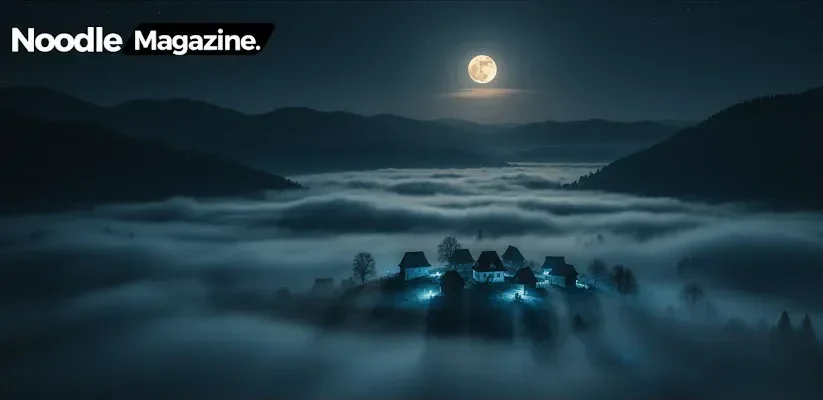Old shepherds in the Apuseni Mountains still talk about it when the rakija flows. Deț doesn’t wait for visitors. It comes looking.
Every full moon, the whole village picks up and moves. Not the people—the houses, the church, the wells, the dogs sleeping under carts. Everything. One night it’s nestled in a Transylvanian valley, the next it’s sitting quiet on a ridge above the Danube Delta, or tucked into some forgotten Carpathian hollow where no road has ever gone.
You can’t find Deț on purpose. That’s the rule. It finds you.
First Sight – The Blue Lamps
Mihai from Sibiu swears this happened to him in 2019. He was hiking alone, lost the trail after dark, phone was dead. Fog thick as sheep’s wool. Then he smelled it—wild thyme, strong, like someone crushed a whole bush under his nose.
He pushed through pine branches, and there it was.
Cobbled streets are shining wet. Lamps burning blue fire that didn’t flicker. Houses with steep roofs and carved wooden gutters, but no electric wires anywhere. An old woman in a black headscarf sat on a bench peeling potatoes that steamed in the cold air. She looked up and said in a dialect he half-understood: “You’ve walked far, boy. Come eat before the moon turns.”
He still has the wooden spoon she gave him. It’s stamped Deț on the handle.
Inside the Village That Wasn’t There Yesterday
The bread comes out of clay ovens still hot. Sarmale wrapped in fresh cabbage leaves, not pickled. The wine is dark and tastes like forest berries. People speak Romanian, but every tenth word is older than the language itself—words linguists can’t place.
There’s always music, but never loud. A violin somewhere, a cimbalom answering it. Kids chase each other between houses with roofs taller than the church steeple in Viscri. Dogs follow strangers like they’ve known them forever.
Nobody asks where you’re from. They already know.
Elena, a photographer from Cluj, woke up in Deț after falling asleep in her car on a forest road. She found her vehicle parked neatly outside a gate that hadn’t existed hours before. An old man handed her a cup of țuică and said, “Drink. The road home will be different tomorrow.”
She still has photos. When she shows them to people from that area, they go quiet. One babă crossed herself and whispered, “That’s Deț. You’re lucky to be alive.”
Reported Sightings Since 1950
People keep records, even if nobody official believes them.
| Year | Location Found | Who Saw It | What They Brought Back |
|---|---|---|---|
| 1953 | Near Lake Bicaz | Shepherd Ion Pop | Silver thimble engraved with moon phases |
| 1978 | Făgăraș Mountains | Hungarian hikers | Hand-woven shirt that never wears out |
| 1994 | Maramureș, near Săpânța | German tourists | Bottle of wine still full after 30 years |
| 2006 | Iron Gates gorge | Fishermen | Wooden flute that plays itself on full moons |
| 2019 | Apuseni caves area | Mihai from Sibiu | The spoon he still eats with every day |
| 2023 | Somewhere in Dobrogea | Truck driver | A whole wheel of cheese that hasn’t gone bad |
The Vanishing
Dawn comes suddenly in Deț.
No slow pink sky. One moment, the roosters crow, the next—mist rolls in thick as milk. You hear church bells, but when you turn around, the church is gone. People keep walking, carrying baskets, vanishing into the fog like they’ve done this a thousand times.
Elena said the last thing she saw was the old woman from the bench waving goodbye. Then nothing. She stood alone on a dirt road with tire tracks that matched her car, twenty kilometers from where she’d parked.
The spoon, the shirt, the wine—they stay. Proof, if you need it. But mostly people just carry the smell of thyme in their clothes for days.
Some say Deț is punishment. Others say it’s mercy—a place for the lost to rest one night before the world finds them again.
Me? I keep walking those mountain trails on full moons. Phone off. Map in my pocket, I don’t look at.
Just in case the fog smells like wild thyme tonight.

